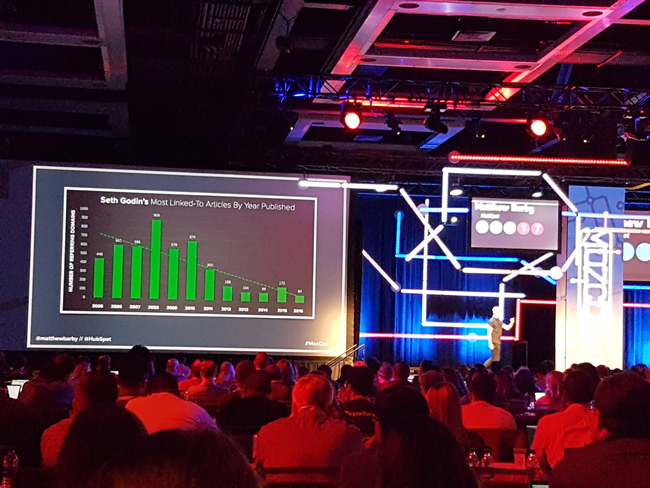DISCLAIMER: This post is written as a live blog from Mozcon. There may be typos and grammar to make my high school English teachers weep. Please excuse those … it’s a fast-paced conference with back-to-back sessions and no time for proofing or even proper writing.
Matthew Barby takes the stage to chat about growing traffic and revenue (you know – what we’re all supposed to do). He starts by talking about bags of tricks and the problem if you don’t understand the why and just know the what in cases where things go outside of what’s to be expected. He talks about how marketers ruin strategies by overusing or abusing them so we need to focus on strategies not tricks
He brings up that shares are moving from blogs and links to social shares and the problem that causes for link building.
At Hubspot they like to look at things they can repeat (good idea). And here’s acronyms ….
SONDGLD – Sh*t Out Numbers Don’t Look Good
SONLG – Sh*t Our Numbers Look Great
Looking to get from here to htere let’s look at
Problem #1
Channel effectiveness – desire for a product goes down or the cost for paid search hits a threshold where it’s no longer profitable. We hit fatigue where we’ve hit our glass ceiling.
Or tougher – what if there’s no search demand for what you have. Like Zapier – who looks for a system to connect apps. Where most would focus on other channels they wanted organic so they created side doors in their site by creating content that showed a layer of intent. For example, writing content on how two products can be used together. They also have review pages on the products they work with.
They also created pages for different functions tied to products.
Basically anything that could rank them for products they integrate with.
He also mentioned their brilliance in internal linking structure (Pro tip – look at their structure 😉
Problem #2
What if you just don’t rank. The key in knowing which level to pull at which time. Is it a discovery/indexing issue? Is it relevancy? It’s it authority? This defines the action to take.
He reminds us that doing more of what’s wrong (like more blogging) doesn’t accomplish the right task and won’t produce the right results. Sage advice.
What if you have the authority but no rankings? The best problem.
Pandadoc had this – there wasn’t a lot of search volume for terms that related directly. So they build a side door and created document templates that might need to be signed (marketing templates, etc.). Sure enough, they ranked well for “RFP template” and a ton of similar phrases due to their strength.
Secret – sometimes you don’t need to create new content (shhhhh). 😉
By categorizing all their ebooks they hoped to rank for generic phrases related to marketing books. Then they looked at the indexing and saw that none of it could be crawled. Thy rebuilt it and immediatley added 50k visitors per month.
All of this required identifying the problem and solving it. You need to understand the why.
BUT
What if there isn’t a problem but you want to explore a new opportunity or explore a new channel. If you get in early you can create a huge barrier to entry for those who follow. But early adoption can also be risky if the channel dies. The play is to find a channel that works but isn’t saturated by your industry. Slip in and solve a problem.
He talks about Alexa and Alexa skills jumping from 135 to over 10k and the absence of paid Alexa apps. He highly recommends it if it at all works as the barrier is very low with big potential gains.
To Do – He wants everyone today to imagine a world where what you’re doing today doesn’t work. What would you do?
You can find his slide deck here.
